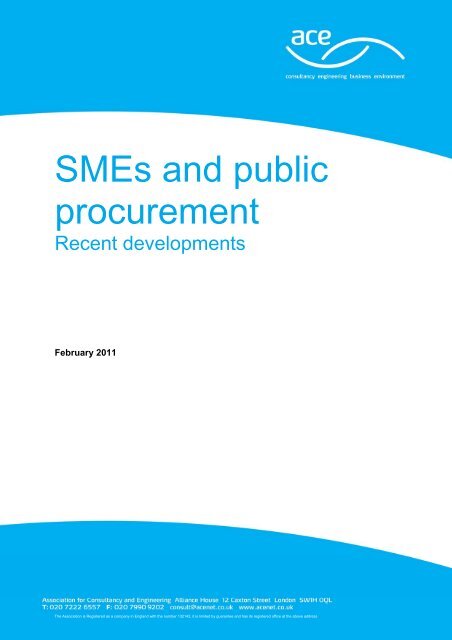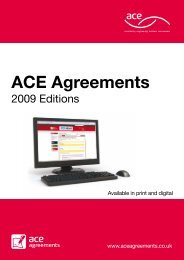SMEs and public procurement
SMEs and public procurement
SMEs and public procurement
You also want an ePaper? Increase the reach of your titles
YUMPU automatically turns print PDFs into web optimized ePapers that Google loves.
<strong>SMEs</strong> <strong>and</strong> <strong>public</strong><br />
<strong>procurement</strong><br />
Recent developments<br />
February 2011<br />
The Association is Registered as a company in Engl<strong>and</strong> with the number 132142, it is limited by guarantee <strong>and</strong> has its registered office at the above address
Recent changes to <strong>public</strong> <strong>procurement</strong><br />
guidelines<br />
The Cabinet Office has announced a package of measures <strong>and</strong> recommendations<br />
aimed at improving access to <strong>procurement</strong> opportunities by <strong>SMEs</strong>.<br />
The government has recognised concerns raised by ACE <strong>and</strong> other bodies regarding<br />
the difficulties that many <strong>SMEs</strong> face in <strong>public</strong> sector <strong>procurement</strong> processes. The<br />
administrative burden <strong>and</strong> cost of <strong>procurement</strong>, inadequate information, repetitive<br />
prequalification processes <strong>and</strong> myriad terms <strong>and</strong> conditions have been highlighted<br />
by ACE members as particular issues.<br />
Summary of proposals<br />
Easier access to opportunities<br />
A new Contracts Finder system has been introduced, to replace the existing<br />
Supply2.gov.uk service. Contracts Finder, run by Business Link, will be a st<strong>and</strong>ard<br />
point of <strong>public</strong>ation for <strong>procurement</strong> <strong>and</strong> contracting information. Access to<br />
Contracts Finder is currently free of charge, compared with the subscription fees<br />
associated with Supply2.<br />
Formal targets<br />
From March 2011, all central government departments will be required to publish a<br />
set of specific, targeted actions to increase their business with <strong>SMEs</strong>.<br />
Larger projects will also be split up into “micro lots” where appropriate.<br />
Reducing over-specification<br />
Departments will be required to adopt a greater use of outcome-based specifications,<br />
<strong>and</strong> avoid over-specifying projects. Major projects will be assessed by the Major<br />
Projects Authority in the Cabinet Office.<br />
Prequalification reforms<br />
ACE members often note that prequalification processes can be administratively<br />
burdensome, unnecessarily repetitive, <strong>and</strong> a drain on resources. Furthermore, a<br />
greater shift away from framework <strong>procurement</strong> toward discrete packages of work<br />
may trigger more competitions – <strong>and</strong> more prequalification.<br />
Therefore, the government has proposed to eliminate PQQs entirely for all central<br />
government <strong>procurement</strong>s below £100,000, thereby allowing procurers free choice<br />
over the best route to market.<br />
Larger <strong>procurement</strong>s will see greater use of the “open procedure”, which would<br />
eliminate a separate selection stage early in the process.<br />
Page 2 of 4
For all <strong>procurement</strong>s in common commodities, systems will allow suppliers to<br />
provide their prequalification data once, avoiding the need for multiple<br />
prequalification.<br />
Building capacity in <strong>public</strong> sector <strong>procurement</strong><br />
Key to improving efficiency in <strong>procurement</strong> is to develop the skills of <strong>public</strong> sector<br />
<strong>procurement</strong> teams. This is particularly true for the <strong>procurement</strong> of professional<br />
services, where project requirements are often non-trivial.<br />
To improve skill levels <strong>and</strong> promote an exchange of ideas, the Cabinet Office has<br />
proposed to set up an interchange programme to bring business secondees into<br />
<strong>public</strong> <strong>procurement</strong> teams <strong>and</strong> send civil servants into the business world.<br />
Innovation <strong>and</strong> feedback<br />
To help ensure that the views of businesses are taken on board, an extended<br />
Supplier Feedback Service will be launched. A “mystery shopper” process will<br />
challenge procurers to be more transparent <strong>and</strong> open, <strong>and</strong> a new SME Panel will be<br />
established to hold the government to account on delivery.<br />
A new Crown Commercial Representative will be introduced to build strategic<br />
dialogue between clients <strong>and</strong> suppliers.<br />
There will also be a series of SME product surgeries, which will allow <strong>SMEs</strong> to pitch<br />
innovative products <strong>and</strong> services to a panel of senior <strong>procurement</strong> <strong>and</strong> operational<br />
professionals.<br />
Analysis<br />
This has the potential to be a significant set of reforms. It is certainly specifically<br />
targeted at increasing access of <strong>SMEs</strong> to <strong>public</strong> sector <strong>procurement</strong> opportunities.<br />
It is particularly encouraging that the government appears to have accepted the<br />
views of businesses on the need for reforms to prequalification processes. Reducing<br />
the administrative <strong>and</strong> financial burden of <strong>procurement</strong> to both suppliers <strong>and</strong> clients<br />
can help to generate significant efficiency savings.<br />
However, free choice for purchasers to select their routes to market also increases<br />
the risk of a lack of transparency in the process of appointment. This could open<br />
purchasers to legal challenge if not h<strong>and</strong>led correctly.<br />
Encouraging consistency of approach across all sectors of government has<br />
traditionally been a challenge. The somewhat autonomous nature of government<br />
departments <strong>and</strong> agencies in the <strong>procurement</strong> process has led to a wide variety of<br />
practices <strong>and</strong> philosophies, particularly in the local government arena. It is pleasing<br />
that Baroness Eaton, chair of the Local Government Group, has endorsed the<br />
measures proposed. However, the culture change required to implement the<br />
measures fully will probably be a longer-term project.<br />
Page 3 of 4
The proposed move towards greater use of outcome-based specification presents<br />
real opportunities to change <strong>public</strong> bodies’ approaches to project management.<br />
Outcome-based specification discourages the use of risk-averse approaches, <strong>and</strong><br />
actively calls for a partnership-driven approach to ensure that <strong>public</strong> bodies get what<br />
they need at a reasonable price. Again, this may require significant culture shifts<br />
within the <strong>public</strong> sector, which will be challenging to implement.<br />
It is also important to recognise that good <strong>procurement</strong> practice does currently exist<br />
in parts of the <strong>public</strong> sector. It would be churlish to be overly-critical <strong>and</strong> ignore the<br />
successful aspects that already exist.<br />
Specific measures to encourage or require <strong>public</strong> authorities to learn from each other<br />
could also generate benefits. There is a pool of expertise already in the <strong>public</strong> sector<br />
that could be drawn on more effectively.<br />
The sharing of expertise between <strong>public</strong> bodies also presents opportunities for cost<br />
savings in the <strong>public</strong> sector. If <strong>public</strong> bodies were to pool their resources in specialist<br />
areas of <strong>procurement</strong> (e.g. construction), then multiple authorities could benefit from<br />
experienced <strong>and</strong> capable professionals while simultaneously reducing the overall<br />
cost of <strong>procurement</strong>.<br />
ACE will continue to promote members’ views on the <strong>public</strong> sector <strong>procurement</strong><br />
process as these proposals are implemented.<br />
For more information <strong>and</strong> to share your views, please contact Michael Hall, ACE’s<br />
head of policy <strong>and</strong> external affairs (mhall@acenet.co.uk).<br />
Page 4 of 4
















